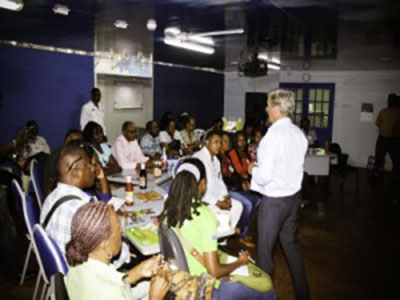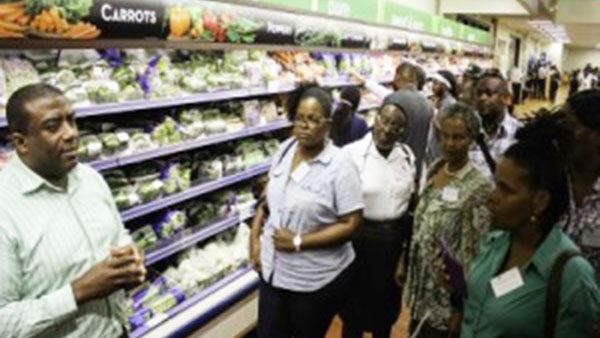Photo above shows Caribbean agri-entrepreneurs and their workshop tutors, touring a leading Caribbean supermarket chain, where they saw first-hand what products looked like that are getting to store shelves and, ultimately, to the consumer.
PORT OF SPAIN, Trinidad and Tobago, Apr. 3, (CMC) – As he makes his way back to his homeland in the Bahamas, Chavara Roker, a small business owner, is hoping that the information he gathered during a three-day workshop here will help him grow his business.
“It was an awesome, awesome experience”, said Roker, who was among 39 agribusiness owners, representing 15 Caribbean countries, that participated in the European Union’s (EU) Intra-ACP Agricultural Policy Program (APP) with a focus on the Caribbean and the Pacific Regions, funded by the 10th European Development Fund (EDF).
“It is going to help me move my business forward; moving my product that I sell from the farm to the table,” he said.
The Product Development, Marketing, Food Safety and GMP for SMEs Workshop, held here last week, was put on by the Inter-American Institute for Co-operation on Agriculture (IICA) and the Caribbean Agricultural Research and Development Institute (CARDI).
“The EU’s interest is long term, knowing that trade and specialization will contribute to higher living standards in both regions,” said Ulrich Thiessen, Program Manager for the Delegation of the European Union to Trinidad & Tobago.
The workshop is part of one project that falls under the action of the 10th EDF. The goals are to promote the development of small holders in agriculture through integration into local, national, regional and global markets.
The organisers said, despite the vast nature of the action however, the workshop itself was designed to equip small, up-and-coming Caribbean entrepreneurs to prepare them to take their uniquely Caribbean products to wider markets.
The sessions addressed important issues such as marketing, labelling and food safety, as well as fostering networking amongst Caribbean business owners and food industry professionals.
The participants were able to hear from experts and get advice about their particular products. They viewed samples of innovative packaging and attractive labelling and together, experts and participants toured a leading Caribbean supermarket chain to see first-hand what products look like that are getting to store shelves and ultimately to the consumer.

Workshop participants were able to hear from experts and get advice about their particular products.
Robert Reid, the technical leader on the IICA-led Component of the project, which focuses on linking entrepreneurs to markets, said that participants and experts, alike, were pleased with the workshop and opportunities that it provided.
“The experts found it extremely enjoyable to share their knowledge. After the one-on-one consultations, we know that they will be in touch and have offered to provide future guidance,” he said.
Shivangi Mahabali, a bee keeper from Suriname, who produces and markets natural honey, was selected to attend the workshop, which had a specific focus on youth and woman business owners.
She said the workshop provided her with an insight “on how to market my product, how to package my product and to develop a good brand.
“To become a very good entrepreneur from the Caribbean that meets international standards so that nobody in the world will refuse my product,” said Mahabali, who was also excited about meeting other beekeepers.
Prior to the workshop she didn’t know anyone in the industry, even in her own country, but met several beekeepers from around the Caribbean.
“It is always good to see how people do things differently and have different insights for the same business. I can use that and get advice. A network is always important. You can look at the strategies and learn from each other so that we become one Caribbean,” she added.
Khristy Beharry of the Trinidad and Tobago Goat and Sheep Society, said she is looking forward to passing food safety information to local farmers so that their products can “stand up to international markets.
She also feels that with new direction on labelling and marketing, farmers will be able to “demand a higher price for their products”.
Reid says innovative packaging and labelling has become key to successfully marketing products in the Caribbean and globally.
“It is now an art, not just a science and workshop participants need to understand the dynamism of competition in supermarket chains which have become the most significant outlets for retail products in the Caribbean.”
The objective of the overall Agricultural Policy Program in the Caribbean is to increase the capability of smallholder agriculture and agribusinesses in the region, with the end goal of tackling poverty.
The organisers said one way to do that is by limiting the need for expensive, imported food in the Caribbean.
They said this can be done by increasing the availability of quality, home-grown, safe and affordable products, as well as making Caribbean products ready for wider markets by meeting international standards for food safety and increased expectations for packaging and labelling.
“The Caribbean has some amazing products to offer,” says Gregg Rawlins, the Representative in Trinidad & Tobago and Co-ordinator, Regional Integration Caribbean Region, IICA.
“This workshop isn’t going to be the complete solution to our challenges, but it is one step in the process of achieving our goals,” he added.
 Pride News Canada's Leader In African Canadian & Caribbean News, Views & Lifestyle
Pride News Canada's Leader In African Canadian & Caribbean News, Views & Lifestyle





